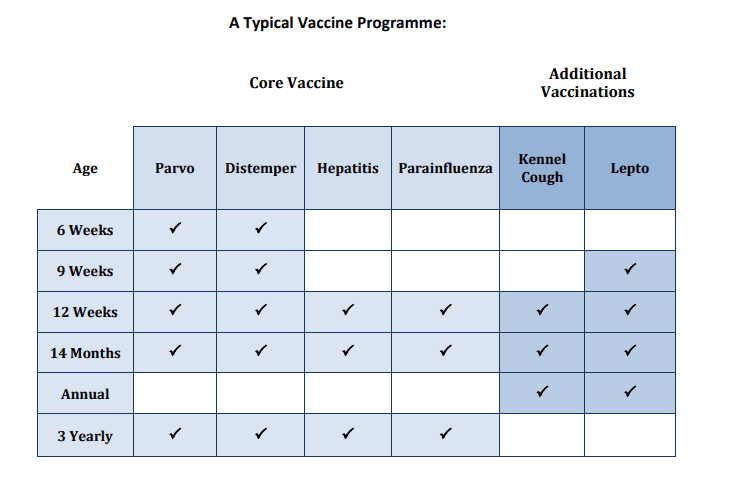Puppy Care
Basic Training
You need to be aware that from about the age of 6 weeks your puppy is like a little sponge and will be absorbing everything that is going on in their environment. You need to start off how you mean to go on. It may be cute to have your 3 kilogram puppy sitting on your lap but do you want your 35 kilogram dog to be sitting on your lap in just a few months time?
- Keep things simple and don’t confuse them with changing rules.
- Don’t expect your puppy to click onto rules and commands straight away: they are still only babies – and can have accidents and make mistakes.
- Use single word commands like – sit, stay, wait, come etc…
- We put nappies on children until they learn to control their bladders, yet we expect our puppies to learn overnight about ‘going to the toilet’. Please be patient!!
- Wherever possible train by praise and reward rather than punishment. (Keep your pocket full of treats at all times!)
Nutrition – Puppies use up an astounding amount of energy in growth and play, so it is crucial to give them the best nutrition available. Every meal counts – it needs to contain all the protein, fat, carbohydrates, vitamins and minerals your puppy needs, in the correct
amounts. Puppies need a growth formula for the first 12 months of their lives. Poor nutrition can lead to many problems including arthritis, obesity, skin problems and internal illness. The good news is that a number of companies have done all the hard work
and scientific research to create complete and balanced premium diets to meet the requirements of a growing dog. We stock a range of premium dog food which can be fed as a complete and balanced diet. If you buy a supermarket brand, make sure it is AFFCO
certified and suited to growing puppies.
Worming – Worming your puppy is not only an essential part of their preventative health program, it is also necessary because of the risks associated with worm transfer from animals to humans. Several species of worms infest the intestines of our pets. They are named by their shapes; Roundworms, Hookworms, Whipworms and Tapeworms.
- Puppies need to be wormed every 2 weeks until 3 months of age and then every 3 months for the rest of their lives.
- Know your puppy’s weight as the worm tablets are given according to weight. (Scales at our clinic are free to use)
- Use a broad spectrum wormer that covers all the worms listed above (NB: Not all worm tablets treat all types of worms!) We stock Drontal and Endoguard which are broad-spectrum wormers.
- Make worming a pleasurable experience e.g. hide the pill in a piece of cheese or dog roll.
Fleas – It is rare that a dog doesn’t have fleas. Remember that just one flea lays 1000 eggs in its 3 month life time. To avoid this flea explosion have a flea control programme in place. To get good control you need a long lasting product. Flea powders last for 2 days; products like Advantage, Comfortis, Nexgard and Frontline last for over 1 month.

It is not recommended to take your puppy into areas where unvaccinated dogs are or have been until 1 week after their last puppy vaccination. This includes the park and footpaths. It is fine to bring your puppy to our Puppy Pre-school classes after their first (6 week)
vaccination. Before puppy class each week all the floors are washed with a virucidal wash – making it a controlled and safe environment.
Exercise
There is one simple rule regarding exercise for puppies less than 6 months of age: no long enforced walks. Free running in the garden or where you can let them off for a gallop is fine, but let them set the pace. The reason why is simple: as the puppy grows, so obviously do his bones and new cells are being formed all the time. These bone cells are soft to begin with, so excessive exercise could cause damage. You would never expect a two year old child to walk two or three kilometers so take it easy on your pup!
Neutering
The decision to breed your dog should not be taken lightly. If you want to breed your dog, it is advised that both males and females should be carefully assessed. They should be clinically sound, free from hereditary diseases, have excellent temperaments, be good
examples of the breed and should be free from infectious disease. Far too many animals that are bred from do not meet these criteria. It is essential you do everything possible to prevent unwanted pregnancies, and to help reduce the number of dogs being destroyed every year. Surgical sterilisation (spaying and castration) is a permanent, safe and hassle free method.
Here are some advantages for neutering:
Dogs (male)
- Change certain unwanted behaviors for the good.
- Less chance of wandering to bitches-therefore less chance being hit by a car, etc.
- No chance of testicular tumors
- Stops prostate problems in the future
- COST: Depends on size-please call the clinic for an up-to-date estimate
Bitches
- Nature of the bitch does NOT change at all
- Stops males from hanging around
- No chance of her contracting uterine infections (life threatening)
- Significantly lessens the chance of mammary tumors
- No costly mistakes (pups can be very expensive)
- COST: Depends on size-please call the clinic for an up-to-date estimate
Neutering age guidelines:
- Smaller breeds-around 6 months of age
- A puppy that will grow to be over about 25kg as an adult there is some evidence to
support they should be neutered at maturity, ie about 1 year or about 18 months for
giant breeds
